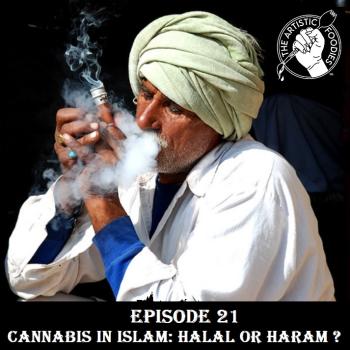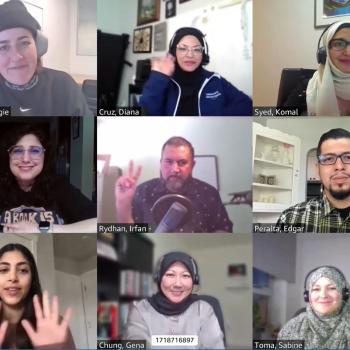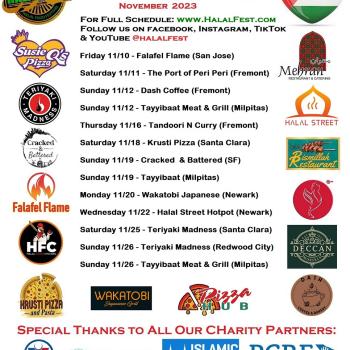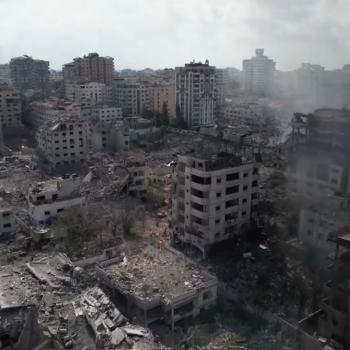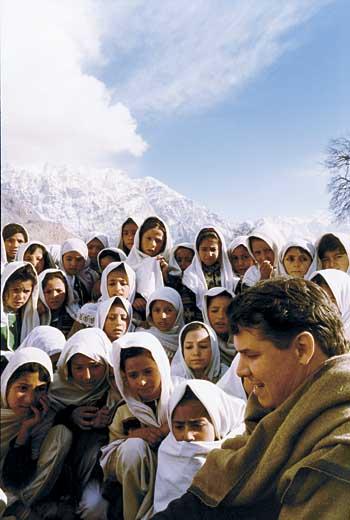 I recently finished reading “Three Cups of Tea” by Greg Mortenson and David Oliver Relin. My first reaction after reading the story of Mortenson’s 15 + year story of building schools for the impoverished children of Pakistan and eventually Afghanistan’s mountain villages was – why do the Non-Muslims do Allah’s work without making any excuses, but we Muslims just argue, cheat and fight amongst ourselves?!
I recently finished reading “Three Cups of Tea” by Greg Mortenson and David Oliver Relin. My first reaction after reading the story of Mortenson’s 15 + year story of building schools for the impoverished children of Pakistan and eventually Afghanistan’s mountain villages was – why do the Non-Muslims do Allah’s work without making any excuses, but we Muslims just argue, cheat and fight amongst ourselves?!
For those who don’t know Mortenson’s story – he was a mountain climber who in 1993 after a failed attempt to climb K2 (the world’s second largest mountain), came across an impoverished Pakistani village who nurtured and helped him find his way after he got lost and stuck in the middle of the Karakoram mountains. In return for the villager’s kindness, he promised to build them a school for their children, after seeing them sitting in an open-air “classroom” of dirt and using sticks in the sand for their lessons.
What makes the story an interesting read (I’m sure a documentary or feature film will be made eventually) is the fact that Mortenson, who worked as a medical assistant in Berkeley at the time, had no prior knowledge of the construction business (especially in Pakistan), and was not too familiar with Pakistani culture, the faith of Islam (which majority of Pakistanis follow) and did not speak Urdu or any of the other Pakistani languages! Besides all of this, he had no organizational help, funding or contacts when he first began this mission of peace. He had to sleep in his car, struggle and scrape to save every little penny and his girlfriend at the time even left him before he got the first school built.
Of course in reality, Mortenson did have many Muslim people who helped him along the way, such as Mouzafer Ali, the renowned Balti porter who led Mortenson safely off the Baltoro Glacier, Haji Ali, the head of Korphe village and Mortenson’s mentor and Syed Abbas, supreme leader of northern Pakistan’s Shia community, who vouched for Mortenson after he received two fatwas against him.
Not only did he have to deal with having two fatwas issued against him which eventually got overturned by higher authorities (yes, there are some intelligent “Mullahs” in Pakistan), but he was also kidnapped by some North West Frontier Tribal villagers who held by for eight days (they released him after they realized who he was). But his most difficult trial, in my opinion, was right after the attacks of Sept. 11th, 2001 (Mortenson was in Pakistan – near the Afghanistan border at the time), when he had to deal with the CIA questioning him and trying to use him as an “informant”, which he declined to do. Not because he was trying to protect his friends, but because he was doing the right thing by keeping the trust he had gained over the 7+ years of working in the remote tribal areas of Pakistan, which he knew had nothing to do with the terrorist attacks, but also would still be in need of schools being built, after the U.S. government and military got involved with the “War on Terror.” Mortenson knew (and still preaches the same today) that the real way to end Terrorism is to provide education (especially for girls), basic needs of people (access to clean water, etc.), and the ability to provide for their families (vocational training, etc.).
Mortenson also had to deal with many hate letters and emails from his fellow Americans shortly after the attacks of Sept. 11th, because they thought he was helping the enemies of the United States. This really got him depressed and down, but at the same time, it forced him to go out into the public and make slideshow presentations about his work. In the beginning, at these presentations he had only 1 or 2 people in the audience. Eventually when his name became more well known (after being featured in several prominent media outlets in 2002 such as the Washington Post, the New York Times and National Geographic) he had large audiences at his speaking appearances. With the help of positive media coverage and the support of his fellow mountaineers, Mortenson was able to help educate the general American public about the work he is doing in Pakistan and Afghanistan and also raise much needed funds for his Central Asia Institute to build more schools.
It’s amazing to read the real life story of a regular American guy, who not only stuck to his word of building a school for the children of Korphe (the village in Pakistan whose members assisted Mortenson during his hiking ordeal), but went above and beyond what he promised to do and as of 2008 has built over 78 schools in some of the most remote and dangerous areas of Pakistan and Afghanistan. Over 28,000 children, including 18,000 girls have benefited from the education they have received at the schools that Mortenson and his Central Asia Institute (www.ikat.org) have built over the past 16 years.
“Three Cups of Tea” is an inspiring story, which I highly recommend everyone to read, especially those of you who are trying to do some good work in your own community and are sometimes discouraged by the obstacles in your way. After reading Greg Mortenson’s story, no one can make any more excuses or say that one person can’t really make a difference in the world today – because he has proven that without a shadow of a doubt you can!
You don’t have to be a wealthy person, a popular politician or a well connected businessman – anyone can help those less fortunate than themselves. You can start right here in your own backyard, since there are many poor and needy people in the United States. Giving in Charity (“Sadaqa” in Arabic) is a teaching of the Prophet Muhammad (S) and it is even better to help build a mosque, school or water well, since they are considered “Sadaqa Jariyah” (continuous charity), as they continue to help the people and their families who use them for many years to come. But if we cannot help to build a school or a bridge in a poor area of the world ourselves then at the very least we should show our support for people like Greg Mortenson, whether they are Muslim or not, because helping humanity is not limited to people of one religion or cultural group. It is what makes us all human.



